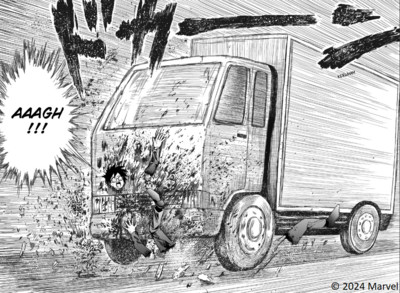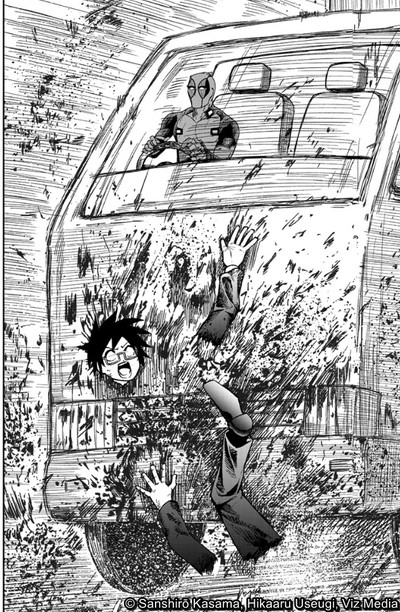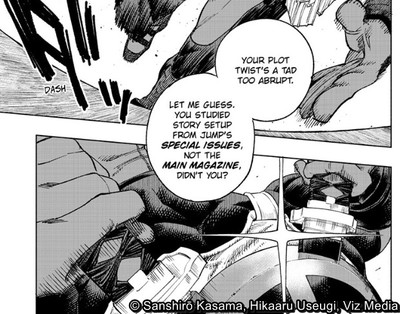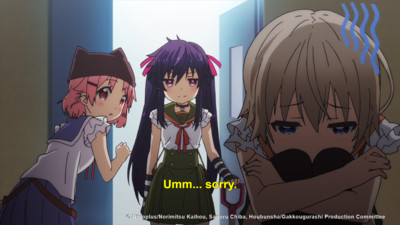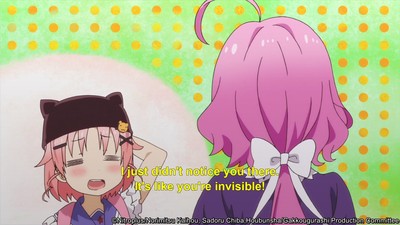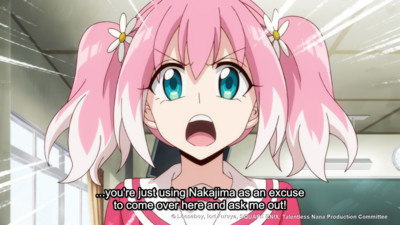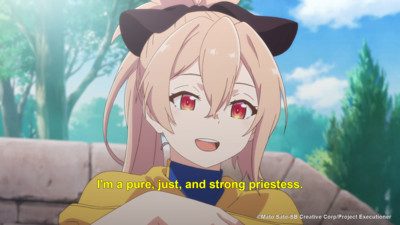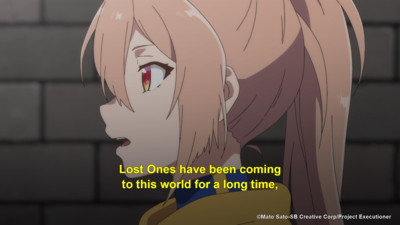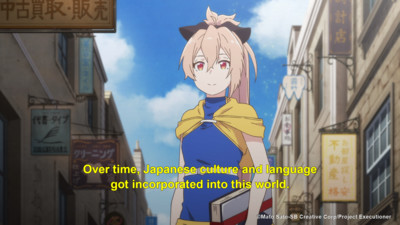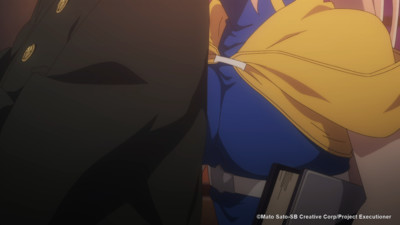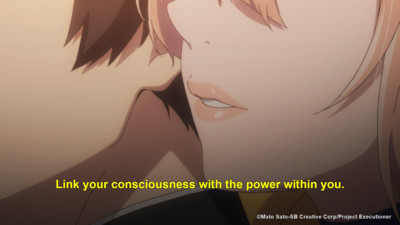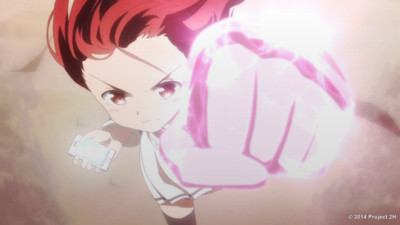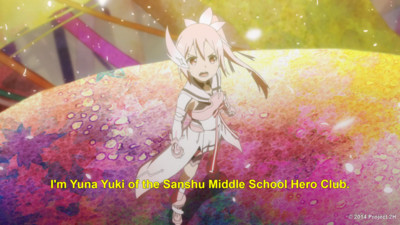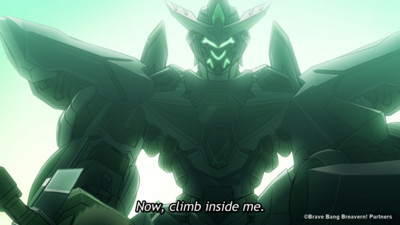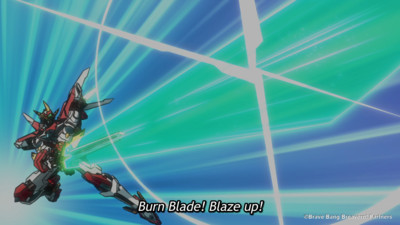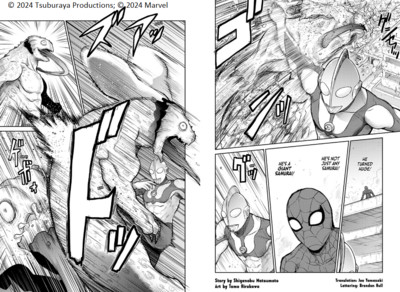With Deadpool & Wolverine becoming the highest-grossing R-rated movie of all time, join Nick and Chris as they dive headlong in Deadpool's recent foray into manga.
Disclaimer: The views and opinions expressed by the participants in this chatlog are not the views of Anime News Network.
Spoiler Warning for discussion of the series ahead.
Pop Team Epic, Talentless Nana, Deca-Dence, and Bang Brave Bravern are currently streaming on Crunchyroll, while School-Live, The Executioner and Her Way of Life, Yuki Yuna Is A Hero, and Akiba Maid War are available on HiDive. Scott Pilgrim Takes Off is streaming on Netflix.
Deadpool Samurai and Ultraman: Along Came A Spider-Man are available on the VIZ Manga app.
Chris
Nick, I covered anime based on DC Comics with Steve a while back, so I think it's only fair to give Marvel its fair shake. It's well-timed too, as everyone's favorite Merc With A Mouth has a stupendously successful movie still in theaters, and he just started the second season of his manga adaptation!

That's right, True Believers! This week, This Week In Anime is doin' Deadpool!
Nick
Well, I'm glad somebody is excited about this. Much as I am a (lapsed) fan of comics, if there's one Marvel character I cringe at seeing, it's the deceased Mr. Pool.
One has to wonder if the fine duo of Sanshiro Kasama and Hikaru Uesugi behind
Deadpool Samurai weren't counting on that contentious reaction to the character, somehow. Obviously, that's why they and VIZ hid the premiere of the manga's second season behind a
completely different series uploaded to the VIZ site: the innocuously titled
Secret Steward.

That was certainly a shrewd move. While I'm not a fan of Deadpool's incessant meta-comedy in any medium, that particular move worked pretty well. Announce an entirely fake new series by the same artists, go around promoting it and giving a debut simulpub, and then flip the table 15 pages in.

That's right, this isn't a romcom manga: it's an ISEKAI manga!
If a Marvel comic starring Deadpool is an option to get isekai'd into, I might just take the ol' bog-standard RPG Maker world.


I say we take this as evidence that Deadpool is responsible for all these god damn isekai anime and imprison him for life. Which is technically an eternity for him.
Well, we don't have that long, so instead we could just give him the punishment he'd really hate the most: ignoring him to cover a completely different subject!

That's right, spoilers everyone, this isn't a column about
Deadpool Samurai, it's a column about a series with fake-out openings before they plot twist to their real premise!
Sorry Nick, right after you said you hate meta-humor.
Hey if it means I don't have to talk about how badly they fumbled Sakura Spider I'll take it. So yeah, we're all familiar with twist endings, but what about twist openers? And I don't mean like, premiere episodes that subvert your expectations or reveal something surprising about the main character. I mean stuff that actively pretends to be something else for most of its own introduction - sometimes even going so far as to completely hide what it's about even in promo materials. We're talking stuff that straight-up lies to the audience for their own good.
What
Deadpool Samurai did here is a pretty extreme example compared to most. The main thing it reminded me of was the intro to the
Pop Team Epic anime. That one was honestly pretty impressive since even though watching it required viewers to click on
Pop Team Epic on their streaming site of choice, the
Hoshiiro Girldrop opening was so convincing it caused several people to go back and make sure they'd chosen correctly!




There's a delicate art to this kind of bluff. If you're too convincing, you risk confusing or angering your audience. If you're not convincing enough, everyone figures out the twist and spends ages waiting for the reveal. PTE was willing to go its route because it genuinely could not care if people got confused by it, which means it already won.
Those kinds of comedic fake-outs work well for stuff like
PTE and Deadpool, but this sort of switcheroo is more often played for drama, and that's where that balancing act you mentioned comes in. It's where you'll find something like 2015's
School-Live, which had to play at being a just entertaining schoolgirl slice-of-life show while still offering tantalizing hints to keep viewers guessing.

Personally, I think that the premiere failed in the first part. Its cutesy slice-of-life effect isn't over-the-top enough to be a tell, and not interesting enough to stick around with if taken at face value. So if you don't already know the twist - or that there's a twist at all - it's just kinda boring, low-energy Cute Girl shenanigans.

Going back to the premiere of
School-Live after all these years (I could not
believe it had been nearly a decade) definitely reinforced its dependency on its gimmick. It basically demands that viewers be aware that there is Something Else going on here to try and puzzle it out, and that's just presuming you haven't read or even read about the manga and are aware of its true status as a zombie apocalypse story.


It's definitely something that works better on rewatch when you know to look for hints and breadcrumbs setting up the reveal. At the time though, when the U.S. media landscape was inundated with way too many zombie shows, it just felt like trading in a boring show for a different kind of boring show. Now, it might play better since The Walking Dead hasn't been relevant in years and we've stopped getting "BUT WHAT IF THIS MAGICAL GIRL SHOW WAS DARRRRRRRK" stories trying to replicate Madoka Magica.
It's admittedly kinda neat to go back and catch things with foreknowledge like when you watch
The Sixth Sense the second time around, but that's the absolute minimum something like this should aspire to.


This whole idea is basically a really hard magic trick. You have to:
A) Create a 1-episode story that's interesting enough to keep people watching
B) Create a second, equally interesting story
C) Introduce that in a way that immediately assures viewers that B will be better than the thing they already liked
D) Do all of that without giving it away too early
It's the golden rule of plot twists: make sure that the plot you're twisting to is more interesting than the plot you're twisting
from. With that in mind, I'll make clear that I'm absolutely not dumping on the whole of
School-Live, which goes on to be a pretty tight apocalypse survivor story with big emotional moments and even bigger plot twists awaiting. But that's why that story lasted 11 episodes while the
Manga Time Kirara riff only lasted one.

It's a case where I think knowing the twist ahead of time helps get people to watch it. Other shows can benefit from going in blind, which I can attest to for
Talentless Nana because just knowing that there
was a twist for that premiere made it horribly boring to sit through.

See for me, knowing that there was some sort of twist was a good reason for me to go into
Talentless Nana, since as someone who generally dislikes
My Hero Academia, just getting a knockoff version of that was not going to hold my attention.


Granted, that dislike of the riffing material meant that, while I didn't guess exactly what
Talentless Nana's twist was until it happened, it ensured that the series went on to become a personal favorite of mine.
For me, it just turned the opening episode into a waste of time. Like, even if I didn't know exactly what the twist was gonna be, I understood immediately that anything the show was doing with these characters was going to be undercut. So instead of trying to invest myself into Nana and Nakajima - which the show really wants you to do before it pulls the rug out - I was constantly checking the progress bar and casually standing several inches away from the rug.
Didn't help that "Actually the cute girl is going to murder everyone" was at once too weak to be shocking and trying way too hard to be shocking with all the evil lighting and filters.


I admit part of the appeal for me was simply in seeing not-Deku get shoved off a cliff to kickstart the real plot, but another part of me was honestly impressed by how much work they put into
trying to make the fake-out believable. They have several backstory flashbacks for Nakajima, a character who gets offed twenty minutes in! I admire commitment, if nothing else.

It probably would have worked better for me if they hadn't, and instead got to the subversion 10 minutes earlier. But again, that's a problem with knowing there was a twist to begin with. I would still have been bored with the fakeout material, but I wouldn't have been annoyed while it went along.
I'll concede that
Talentless Nana is another case where the rest of the story is more interesting than the gimmicky introduction to it. Nana goes on to become more layered and interesting than the simple "murderous cute girl" trope, and seeing
how a powerless pink angry puffball actually takes down all these superpowered dweebs is a compelling setup.

That tends to be a point in the favor of these kinds of flip-flops: by their very nature, they're setting up some interesting, unique story scenarios that the authors seem able to effectively ride for the long term. Which I guess comes with the territory when you're writing a story that's specifically about why you wouldn't want to write a different kind of story.
Personally, I think brevity is the best option. Spending a full episode on the distraction means the audience has no time to get invested in your actual story, so if the immediate shock doesn't work then you've just Surf Dracula'd yourself. So if I'm gonna have a secret murder girl pretending to be a stock sidekick love interest for a loser male lead, I'll Menou over Nana any day of the week.

I can't fault your choices. Her potato-chopping abilities alone are an impressive skill!

More importantly, her show's fakeout only lasts half an episode, and even before it has a lot of interesting ideas compared to the isekai stories it's riffing on.


Like hey, that's some actually interesting world-building that takes the idea of modern isekai stories to logical endpoints. It's intriguing enough on the concept that I actually wanted to see more before Potato-kun's brain got perforated.
The good news there is that
The Executioner and Her Way of Life does continue to follow through on that another-world-building. It does so both by going even harder on the idea of what an environmental hazard superpowered transported teenagers would be to a fantasy world and by introducing a second, more entertaining isekai'd kid for Menou to (try to) murder.


Most importantly, it does all that
in the first episode. So once the shock from the okie doke has worn off, we still get a fulfilling second half that actually tells us what we can look forward to.

As much as I enjoy
School-Live overall and even liked
Talentless Nana from the beginning, rewatching all these classic examples for comparison did confirm that
Executioner's brevity behooves this gimmick. Even
Secret Steward knew not to wait more than 16 pages before Wade Wilson drove a truck through the presumed protag. And similar to his swordplay, I wouldn't like
Executioner nearly enough at the outset if we didn't get to see Menou's sick moves.

Even more, the way the fakeout is integrated into the story is actually a buildup for what comes next. It shows us how Menou works - acting as a benevolent assistant, establishing herself as a side character in her targets' stories before striking when their guard is down. So when we see her do the same thing to Akari, we're in on the trick and are anticipating how she'll pull it off. Also, it's funny to look back at just how much she was playing up the love interest role with The Corpse Formerly Known as Protag-kun.


Some of her reactions are foreshadowing for
multiple things!

Part of me does wonder how
Executioner's anti-isekai swerve plays for different audiences. Like us on the critical catharsis side, we were thrilled to see this bog-standard boy get and the narrative be upended. But I know there's enough viewership out there for said bog-standard isekai stuff that there might've been people actually upset to see the ostensible self-insert get stabbed.
Well, they can go watch the other eight identical versions of this premise we get every season. If you're that upset about a single show subverting your expectations then I dunno, go grumble with the Scott Pilgrim Takes Off detractors.
Wait, we can't have them go there, I was actually going to bring up
Scott Pilgrim as part of this discussion too!

After all, "Pretending to be a straight
Scott Pilgrim adaptation when you're actually an arguably better
Scott Pilgrim sequel" is an extremely unique position even within this oddity of a subgenre.
It was definitely a unique take - though the growing number of FF7 Remake style projects is starting to wear the novelty off.
It's the reason it's generally best if bits like
Talentless Nana and
Executioner Life are spaced out—just one "Go and watch it now without looking up anything about it!" entry every few seasons, to make sure it's not too easy for audiences to get wise.

Mostly I just appreciate that Takes Off never flinched with its marketing so you really could go in blind. Literally, the only vague tell was the title, and that sure as hell didn't tell you anything.
Granted, Netflix's binge-dump release schedule took a lot of wind out of the potential for the show to really hype itself up off discussion just after that first episode, but that's the fault of the platform, not the series.


At the same time, it meant you could immediately see what this new version was going to be, which is a net good when something like this turns up.
True, it drove good word-of-mouth for the show overall, which is a nice payoff to see for what's a rather risky gambit with an established property like this.
Honestly, I wish more marketers would just start lying to me. In an era where every show or game will drip-feed information for months, being kept in the dark feels like a pleasant favor. Like, I remember back in the day when
Yuki Yuna is a Hero completely hid what it was actually about, and it made the actual premiere one of the hypest moments in my early seasonal viewing journey


Man, I wish it had kept that energy up, and I'm saying that as someone who liked the latter seasons of Yuki Yuna more than most.
Oh yeah the show itself crapped the bed. But for 10 glorious minutes, I was in awe of them shadow-dropping a wholly original magical girl series that immediately kicked this much ass.


It's enough to at least partly elevate the series in my memory. That's the power of a well-kept surprise.
That's another way of subverting this subversion: earnestly doing your story from the get-go, and just layering the surprise on as an extra-engaging bonus. I remember when
Deca-Dence delivered an extremely solid post-apocalyptic action premiere that had audiences totally ready for more. Only after a brief tease in the first episode did the next week drop the full truth of its
far more offbeat actual premise.




That's when my feed
really went nuts for the show.
I almost don't want to count it since they held off for an entire episode, but by God was it effective? More importantly, it was a twist that didn't nullify what we saw before - it just evolved our understanding of what was going on and what the stakes were.
Even absent someone getting shockingly murdered, that should be the goal of these kinds of swerves. The ones we remember for our enjoyment of the full series work because they're designed around building on the presumed premise by using those subversions. So the stories are still doing interesting things with well-worn stuff like the superhero or isekai genres, even apart from seeing somebody stabbed by surprise.

To comparatively bring things back to Deadpool, something like
Secret Steward is a decently funny party trick, but isn't really a layer within the work itself.
It's like those little black power snaps you can throw on the ground to startle people: brief, flashy, and a good way to get a reaction, but not something you can build upon.
Bang Brave Bang Bravern could only work because its creators committed every ounce of their spirit to the bit.


Hell, in that case, I think we were just ecstatic to get confirmation that Masami Obari really was making another super robot anime.
It wasn't exactly a shock, but the joy of going from an okay-looking Real Robot show with Top Gun as garnish to putting the "Gay" in GaoGaiGar was such a revelation it almost made up for having to wait an extra week to watch it.
It also helped that Cygames had made a name for themselves sponsoring these sorts of swerves, with several of their productions understanding that all-important rule of timing being everything. After all the build-up making clear it would, indeed, have a twist,
Akiba Maid War's first episode didn't wait more than a minute to make clear what that twist was.


The point is that the element of surprise is potent. With the right circumstances, it can catapult a show into discussion immediately. Yet it's a tricky and fickle thing to handle. You have to time it perfectly. As perfectly as THE ASTOUNDING COMBINATION OF SPIDER-MAN AND ULTRAMAN IN THE CROSSOVER OF THE CENTURY.

Be y'all didn't see that coming.
Like they say in the mighty Marvel manner: 'Nuff Said!
 @Lossthief
@Lossthief @BeeDubsProwl
@BeeDubsProwl @LucasDeRuyter
@LucasDeRuyter @vestenet
@vestenet That's right, True Believers! This week, This Week In Anime is doin' Deadpool!
That's right, True Believers! This week, This Week In Anime is doin' Deadpool!

